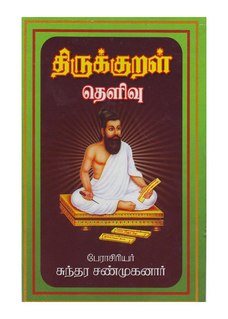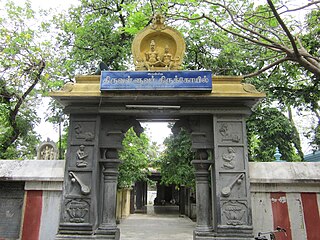 W
WThe Tirukkural, or shortly the Kural, is a classic Tamil language text consisting of 1,330 short couplets of seven words each, or kurals. The text is divided into three books with aphoristic teachings on virtue, wealth and love, respectively. Considered one of the greatest works on ethics and morality, it is known for its universality and secular nature. Its authorship is traditionally attributed to Valluvar, also known in full as Thiruvalluvar. The text has been dated variously from 300 BCE to 5th century CE. The traditional accounts describe it as the last work of the third Sangam, but linguistic analysis suggests a later date of 450 to 500 CE and that it was composed after the Sangam period.
 W
WThe Kural is one of the most important forms of classical Tamil language poetry. It is a very short poetic form being an independent couplet complete in 2 lines, the first line consisting of 4 words and the second line consisting of 3. As one of the five types of Venpa stanza, it must also conform to the grammar for Venpa, the most difficult and the most highly esteemed of stanzaic structures in classical Tamil literature. The Tirukkuṛaḷ by Tiruvalluvar, one of the greatest philosophical works in Tamil, is a typical example.
 W
WSarvajna and Tiruvalluvar are popular Kannada and Tamil poets, respectively. Statues of Sarvajna in Tamil Nadu and Tiruvalluvar in Karnataka has been unveiled in August 2009 as a symbolic effort to bolster ties between the two Indian states, whose relationship has been strained by issues related to sharing of Kaveri water and Hogenakkal water supply power project.
 W
WThiruvalluvar, commonly known as Valluvar, was a celebrated Tamil poet and philosopher. He is best known as the author of Tirukkuṟaḷ, a collection of couplets on ethics, political and economical matters, and love. The text is considered an exceptional and widely cherished work of the Tamil literature.
 W
WThe Thiruvalluvar Statue, or the Valluvar Statue, is a 41-metre-tall (133 ft) stone sculpture of the Tamil poet and philosopher Valluvar, author of the Tirukkural, an ancient Tamil work on Dharmic and morality. It is located atop a small island near the town of Kanyakumari on the southernmost point of the Indian peninsula on the Coromandel Coast, where two seas and an ocean meet. The statue was sculpted by the Indian sculptor V. Ganapati Sthapati, who also created the Iraivan Temple, and was unveiled on the millennium day of 1 January 2000 by the then Chief Minister M. Karunanidhi. It is currently the 25th tallest statue in India.
 W
WThiruvalluvar Temple is a temple dedicated to the poet-saint Valluvar in the neighborhood of Mylapore in Chennai, India. The temple is located within the Ekambareswarar temple complex. Believed to have been constructed in the early 16th century, the temple was extensively renovated in the 1970s. The temple is under the control of the Hindu Religious and Charity Endowment Department. The temple also serves as the venue for meetings of Tamil language enthusiasts.
 W
WTirukkural, also known as the Kural, is considered one of the most widely translated non-religious works in the world. As of 2020, the work has been translated into about 41 world languages. As of 2014, English language alone had about 57 versions available, which is estimated to have crossed 100 by 2020.
 W
WValluvar Kottam is a monument in Chennai, dedicated to the classical Tamil poet philosopher Valluvar. It is the city’s biggest Tamil cultural centre.
 W
WValluvar year, also known as the Thiruvalluvar year, is an officially recognized Tamil calendar system for use in Tamil Nadu. It is calculated on the basis of the supposed year of birth of the Indian poet-philosopher Valluvar. When comparing it with the widely used Gregorian calendar, Thiruvalluvar year will have an additional 31 years. For instance, the year 2020 in Gregorian calendar way is 2051 in the Thiruvalluvar year.
 W
WVasuki was a Tamil woman who lived around the late Sangam era. She was the wife of the Tamil poet-philosopher Valluvar.